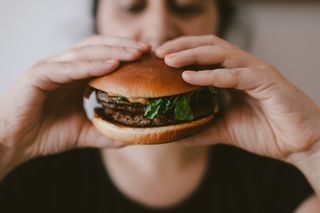Ethics and Morality
Why Are There So Few Vegetarians?
Psychological barriers to plant-based eating.
Posted January 1, 2020 Reviewed by Lybi Ma
One of the most significant moral dilemmas of our time turns up daily on our dinner plates. Our appetite for meat requires the suffering and death of billions of animals every year and is one of the leading drivers of climate change and biodiversity loss. The meat industry is responsible for the kinds of environmental disasters we associate with oil spills, and overfishing is tipped to deplete global fisheries within three decades.
Once we might have pleaded ignorance of these harms, imagining happy pigs rolling in mud on lush family farms. But films like Food, Inc., books like Eating Animals, and a startling World Watch report on livestock and greenhouse gas emissions, have all left us well-informed about the problems we personally finance almost every time we eat.
Once we might also have shrugged with regret that our hands are tied—we need to feed ourselves, after all. But today, at least in developed countries, we have a world of choice. A wide range of fruits, vegetables, legumes, and grains can be purchased at any local supermarket, over 30,000 plant-based cookbooks are available on Amazon, and meat-free meals can be found on most restaurant menus. Choosing the vegetarian option is about as difficult as saying “I’ll have the vegetarian option”.

Only 5-10% of people around the world adhere to a plant-based diet while the vast majority reach for more bacon. However, around a third of Americans and even more Europeans identify as conflicted omnivores—they eat meat but feel bad about it. When the door to an expanding smorgasbord of plant-based fare stands wide open, why do so many of us dither on the threshold like house cats? Clearly there are psychological barriers to meat-free living even if there are not pragmatic ones. These barriers are like small walls—easily climbed, but enough to slow our moral progress.
Perhaps the most obvious barrier we face is our strong preference for the taste of meat. The transition to meat-eating was a significant chapter in the evolution of our species, and our carnal desire is deeply ingrained, both culturally and biologically. When our meat-eating habits are challenged by an opposing motivation—such as our wincing aversion to animal cruelty—we experience “cognitive dissonance”; an uncomfortable feeling of psychological conflict which we then try to resolve. The easiest means of doing so often involves shifting our perceptions and beliefs, rather than our behavior.
Brock Bastian and his team at The University of Melbourne have shown how cognitive dissonance plays out when meat-eaters are reminded about the suffering of farmed animals. They showed participants a picture of a farmed animal, such as a cow. One group of participants were told that the cow would be moved to a different paddock to eat grass, while the other were told it would be “taken to an abattoir, killed, butchered, and sent to supermarkets as meat products for humans.” All participants were then asked to rate the degree to which they believed the cow possessed various mental capacities, such as the ability to think or to feel pleasure and pain.
Participants who were told that the animal would be slaughtered for human consumption attributed significantly lower mental capacities to the cow compared to those who were told that it would simply be moved to another field. It seems that by denying the minds of “food animals” we can feel better about eating them. Bastian and colleagues suggest that this process—changing our thoughts so that they are aligned with our acts—helps perpetuate all kinds of morally questionable behaviors beyond meat-eating.
We also fail to act on the reasons against eating animals because, at least where ethics is concerned, we don’t seem to be swayed by reasons. The average person appears to derive their sense of right and wrong intuitively, rather than rationally, and individuals who rely more strongly on intuition tend to hold stronger moral convictions.
Matthew Stanley and his colleagues recently provided a stark demonstration of our indifference to moral reasoning. Across several experiments, participants were presented with carefully crafted moral dilemmas (e.g., whether or not to leave a note after making a minor scratch on a car) and asked what they would do in each scenario. After making each decision, participants were given reasons that either supported or challenged their initial decision, and were then allowed to revise that decision. Regardless of which set of reasons they examined, participants were much more likely to stick with their initial choice than to change their mind. They also grew more confident in their choice, even after being presented with reasons that argued against this choice.
Importantly, reasons do influence our behavior in other contexts, such as economic decision-making and consumer choice. They just don’t seem to matter much to our sense of what is moral.
If reasons don’t persuade us of what is right and wrong, then what does inform our intuitive ethics? One answer we can give to this question is “norms”. Most Americans think it’s OK to eat pigs and cows because it is normative to do so in the US. This is especially the case for those who place a lot of value on tradition, such as turkey for Christmas dinner. Conversely, many Americans might disapprove of eating horses, dogs, or whales, none of which are commonly consumed in the US. The principle seems to be: “if most people around me do it, then it must be OK”.
Björn Lindström and colleagues at the University of Zurich have provided clear evidence for our reliance on this “Common = Moral” heuristic when judging right from wrong. Across nine experiments, they showed that participants judged selfish behaviors as less immoral when they were described as being relatively common. On the flip side, generous and prosocial behaviors were judged to be less moral when they were described as being relatively rare. Participants also thought that the same selfish behaviour was more deserving of punishment if it was relatively rare, compared to if it was relatively common. From this we can surmise that most people think eating animals isn't too bad, ethically speaking, simply because it is common.
Given the many psychological barriers to plant-based eating, it is no wonder that most of us still eat meat. As a species we are wired to reduce the conflict we feel about our meat-eating habits, not to change those habits. We also are disposed to construct our morality intuitively, around norms and heuristics rather than reasons and arguments, rendering us less responsive to arguments for ethical vegetarianism.
Of course, such bugs in our nature can be overcome, as they have been throughout the history of social and moral progress. As a fringe view becomes more widespread it reaches a tipping point, accelerating and overturning the status quo. It remains to be seen if the rising tide of plant-based eating can similarly breach the psychological levees of carnism.
Facebook image: Estrada Antont/Shutterstock




